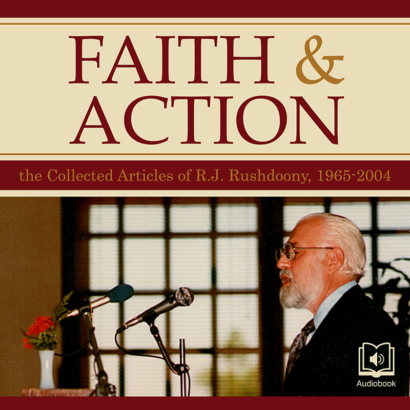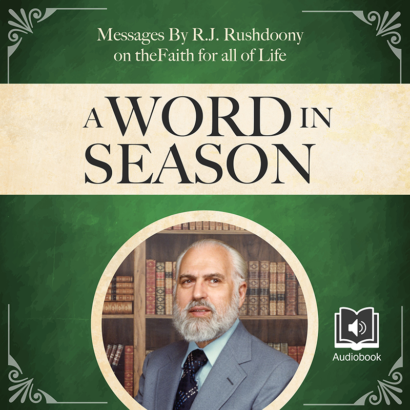
The Roses of Success
• May, 12 2024
In episode 15 of "The Last Kingdom," titled "The Roses of Success," host Jeremy Walker explores the transformative power of perceived failures within a Christian context. He challenges the notion that failure is detrimental, proposing instead that setbacks are crucial for growth and success. Drawing on biblical passages and the poignant song "The Roses of Success" from Chitty Chitty Bang Bang, Walker discusses how each failure seeds the ground for future achievements, emphasizing that true prosperity and growth are achieved through faith and adherence to God's commandments. This episode inspires listeners to view their struggles as opportunities for development and spiritual deepening, reminding them that every challenge is a step toward success.
Hosted by
Husband, Father, Pastor, Teacher, Podcaster, and Christian Education Advocate
- Series: The Last Kingdom
- Topics:
Jeremy Walker (00:05):
And welcome back to another episode of The Last Kingdom. I'm your host, Jeremy Walker. This is episode number 15 for May the 10th, 2024. This episode is entitled The Roses of Success. Our topics will include the question about, is failure really failure for the Christian or is it just the first step to success? We'll be discussing why people hate the facts of biology, economics, and even statistics discussing what would the world be like without black people? We'll be discussing, of course, man or bear. It has been in the news recently. Why there is a surge in women seducing young men in school, and of course, is your child better off homeschooled or are they better off in a government school?
(01:04):
Well, welcome back to another episode of The Last Kingdom. I have quite a few topics here I'd like to get to, but before we begin, I'd like to start with our scripture reading, which is Psalms chapter one. "Blessed is the man that walketh not in the council of the ungodly nor standeth in the way of sinners nor sitteth in the seat of the scornful, but his delight is in the law of the Lord and in his law doth he meditate day and night and he shall be like a tree planted by the rivers of water that bringeth forth his fruit in his season. His leaf also shall not wither and whatsoever he doeth shall prosper The ungodly or not so, but are like the chaff which the wind driveth away. Therefore, the ungodly shall not stand in the judgment nor sinners in the congregation of the righteous. For the Lord knoweth the way of the righteous, but the way of the ungodly shall perish."0.
(02:03):
The first question we have to ask ourselves is, is failure always failure? See, the Christian's life is marked by a few things. Success, not failure, growth, not stagnation, maturity, not perpetual, adolescence and prosperity, and not poverty. These things are very important to understand because people just don't get it. If you are a Christian, and you are listening to this, this is very important for you to understand, to absorb and to enact in your daily life. You are not going to wake up in the morning and have an attitude that today you're going to fail. Either you're going to fail in what you're supposed to do, it being a parent, it being a spouse, it being an employer or an employee or any venture that you're going into. You don't wake up going, "I'm going to fail today." Nope, your focus should be success. "Today I'm going to achieve X, Y and Z. The Christian's life is marked by growth, not stagnation. You should always be moving forward. You should always be getting better at something that you're doing, something that you're achieving.
(03:24):
If you find yourself in a stagnant state, this is reason for concern because the Christian's life is always about growth and moving, moving, moving, growing, growing, growing. We are supposed to be maturing every single day. We are not supposed to stay in our current state of adolescence, either physically, emotionally, and specifically religiously and morally. You should be growing in the power to keep God's commandments and that is a mark of a Christian, and you're also going to be growing in prosperity, not poverty. When I was growing up, the concept was that all Christians were going to be suffering servants as the term was. You're never supposed to have wealth here and now in this world. It's just the way it is. The world belongs to Satan not God, therefore, there's no way for a godly person to succeed in this life because it runs on different rules. We keep the commandments of God. You will not succeed in this life. It does not give you temporary prosperity, but only heavenly prosperity.
(04:39):
Well, this is not true. That would be the same as every church in America saying, that if you want to prosper, you have to be a thief. You have to be a liar, you have to be an adulterer, and these are the people that are going to succeed in this life and in the life to come. But as Christians, we know that's not true. Look around. Which person prospers in this world? The liar or the honest man? The hardworking or the lazy? The thief or the person who does a good job? See, we know instinctively this is not true, but we have this dynamic in our brains, this myth, that somehow keeping God's commandments does not equal prosperity here and now and also in eternity. There was a movie which was a great movie, Ender's Game. It was a book first. The book was even better. But there was a scene where one of the instructors was teaching and he said, "The enemy will show you where you are weak and where he is strong." And this is part of the Christian's life as well.
(05:46):
The enemy is all around us and the enemy, well, is in you. You don't need Satan to blame failures and sin on. You do that just fine on your own. But this is very true for our failures because our enemy, those who are on the outside, and of course those on the inside, they will show us where we are weak. You'll show yourself where you're weak, where your failures happen, and you'll also show you where your enemies are strong, and that includes your sin nature. If he is strong inside of you and what sins you have to be aware of, what sins you have to be on the lookout for, to avoid, and of course those of others. But I say all that to say that failure is not part of the Christians life, and even when we do fail, we can get up, we can brush ourselves off and we can move forward.
(06:41):
I would like to share with you the song, The Roses of Success. It comes from the wonderful movie Chitty Chitty Bang Bang, great movie, Dick Van Dyke, wonderful, wonderful movie, and The Roses of Success, I remember as a child, listening and watching that movie, but I didn't quite understand the significance of the song itself, so I want to just play it. We have three different parts to play. I'm going to play the first part and then we'll continue.
Song (07:11):
Every bursted bubble has a glory. Each abysmal failure makes a point. Every glowing path that goes astray, shows you how to find a better way. So every time you stumble never grumble. Next time you'll bumble even less. For up from the ashes, up from the ashes, grow the roses of success. Grow the roses, grow the roses, grow the roses of success. Oh, yes. Grow the roses, those rosy roses, from the ashes of disaster grow the roses of success.
Jeremy Walker (07:56):
Now, as an adult, this song means different things to me than it did as a child, and of course as a Christian, it means even more to me. I think the best way for me to describe what this means to me, The Roses of Success, is not to focus on failure, even legitimate failure, because as Christians, we are growing, we are maturing, and one way that we mature is by seeing our failure, by confessing our failures, and of course asking God to help us to move forward. As we were talking about, in our scripture passage, we are going to grow like a tree by water. That's right. We are going to grow and continue and continue and continue to grow. We're going to bring forth fruit. Fruit for the Christian is obedience unto God. It means being a better husband. It means being a better parent, an employer, an employee, a better friend, a better everything because you are going to constantly, constantly grow.
(09:01):
You're going to be a giver of life and light to everyone around you and the person that you're going to be the hardest on, of course, is yourself. Whenever you go astray and do something that you should not or wish you hadn't done, that will definitely make a point. It might be an abysmal failure, as of course The Roses of Success states, but even though you might go astray, it can point you and show you, guess what, a better way. You might stumble but never grumble. Next time you'll bumble even less. That is a wonderful image for the Christian's life, though you should understand that failure is failure. It's not going to be something that marks your life. That's right. It's not something that is going to latch onto you and leech on to you and define you. In fact, if you're heading in the right direction and you run off the road a little bit, it does not mean you change direction just means you have to correct and get back on course.
(10:04):
That's right. Because from the ashes of your failures, no matter what those are, those are when The Roses of success will grow because the mark of a Christian is not a sinless perfect life. That's a mistake that many people make, and if you think that that's what you're going to be, you will then become distraught whenever you sin. That's right. Every time you sin, it'll be like the worst thing you've ever done and that somehow you don't see a way out and somehow you're no longer this Christian and somehow you are just a person who's in complete rebellion against God. No, that's not the case. Just because your child disobeys you or does something that they shouldn't do does not mean that they hate their parent or that they're trying to rebel against their parent. It just means that they failed and then a good parent corrects their child and the child gets back into a good relationship with them and all those around them, and that is the Christian and the Christian life.
(11:05):
We are future oriented people. We're not past-bound, and that's something that Christ has given us in forgiveness. The forgiveness of Christ frees us from sin and guilt and allows us overcome sin so those roses from that disaster, that sin, can grow roses of success and we move forward. And so we are marked not by failure, but by success. And next time we're going to bumble even less. Let's go ahead and listen to the second part of this song.
Song (11:40):
For every big mistake, you make be grateful. Yeah, yeah. That mistake you'll never make again. No, sir. Every shiny dream that fades and dies, generates the steam for two more tries. There's magic in the wake of a fiasco. Correct. It gives you that chance to second get. Oh, yes. Then up from the ashes, up from the ashes, grow the roses of success. Grow the roses, grow the roses, grow the roses of success. Grow the roses, those rosy roses. From the ashes of disaster grow the roses of success.
Jeremy Walker (12:29):
In this song, the second part here makes another great point that I think Christians should pay attention to. When you make a big mistake, be grateful. Why? Because that will show you where you're weak and show you what you need not to make the mistake of again, growing in the power to keep God's commandments. These will show you the areas that you need work in. That's right, and that's something that we need. It's called sanctification. It's growing. I love the comment about it generating steam for two more tries. That's right. Every time a person fails, specifically a Christian, and if you're listening to this, I hope this helps you because you are going to fail. You're going to have to get dirt on your knees as you grow and as you're sanctified. The old man, you're going to have to resist and destroy and die to every single day. It's part of the Christian's life, but every time you fail, it reinvigorates you and your faith in Christ and your dedication. It generates that steam for two more tries. It's just a wonderful little statement.
(13:38):
"There's magic in the wake of a fiasco." And that's exactly what I would consider any type of failure, and we're not talking just about sin here, but in life as well. In your work, in being a parent and as a parent of 11, I can tell you that I have thought I've been a failure my whole life as being a parent. I don't think anybody, if they're honest with themselves, really believes that they really know what they're doing. If you're a husband, if you are a wife, then I am sure you can relate to this. Dealing with that relationship with your spouse, you always fail and feel like you don't know what the heck you're doing and how to make this person happy, how better to get along. And so for me, I think this song applies to basically everything that we do, every part of our life, not just, of course, we're talking about the sin, nature and overcoming sin, but everything you do, you want to work even harder at every time you fail in that relationship, you fail as a parent in thinking you weren't patient enough or didn't do enough. It gives you steam to get up and go.
(14:45):
And so instead of being past bound, you can see roses on the horizon. That's right. It's making you better. The Bible talks about God using iron to sharpen iron. That's right. Every time you fail, you get a little bit more sharp. Every time you fail, you get a little bit cleaner because next time you get up and you clean yourself, even better. You see the problem and you ask God to help you overcome that sin next time. You see that problem with your spouse, you see that problem you had as a parent or at work, and next time you're going to do even better. We are future oriented people, not past bound people, and that's why this song resonates with me so much because it's not about looking at your failures, it's looking about where you want to go and getting there. Let's listen to the last part.
Song (15:42):
Disaster didn't stymie Louis Pasteur. No, sir. Edison took years to see the light. Right. Alexander Graham knew failure well, he took a lot of knocks to ring that bell. So when it gets distressing it's a blessing. Onward and upward you must press. Yes, yes. Till up from the ashes, up from the ashes grow the roses of success. Grow the ro, grow the ro, grow the roses. Grow the ro, grow the ro, grow the roses. Grow the roses of success. Grow the ro, grow the ro, grow the roses. Those rosy ro, those rosy ro, those rosy roses. From the ashes of disaster, grow the roses of success. Start the engines. Success. Batten the hatches. Success. Man the shrouds. Lift the anchor. Success.
Jeremy Walker (16:52):
Onward and upward we must press. That is absolutely the calling card for us as Christians. Our life is about moving, moving forward, growing, being better. Every time we get into distress, our lives, whatever problems we run into, no matter how difficult it is, we never give up. We never stop trying. We never stop getting better. We never stop helping others, and we are going to eventually press, press, press, press, press until we grow up out of the ashes of any disasters and failures we may have had in the past. And we get to see the roses of our successes. Our successes as individuals over ourselves, our sins as husbands, wives, parents, employers, employees, everything. The future is bright and part of that is going to be failure. Part of that is going to be difficult. Part of that is going to be toil, but don't be disheartened. You are going to, if you're a Christian, rise, rise, rise, and you are going to eventually see the roses of success.
(18:08):
As long as you don't give up. As long as you don't give in, you are going to succeed. We are overcomers, we are not past bound. We are future oriented and our future is always bright in Christ. So hopefully that has given you some inspiration. I think we need inspiration every now and then. It can be difficult at times to get up in the morning, see the duties, responsibilities that you have or maybe even the failure of midday, and then you have to say, "What now?" Brush yourself off and keep pushing forward until you get to see those roses.
(18:50):
And now I'd like to go ahead and talk about some of the other items we have, world events and whatnot that caught my attention and give a Christian perspective on them. The first I'll touch on is a meme. I touched on three different categories of people and how they either dislike or hate what we call reality or facts. And one was the group of transvestites who they said hated biology or the facts of the human body, the male-female dynamics, communists who hated economics or the idea that somehow stealing from others can make everyone prosper, and lastly, the BLM protesters or Palestinian protesters or insert your college campus protesters here, how they hate statistics, and of course they don't like the idea that certain people can be lumped into categories and facts are about those people, generally speaking not as individuals, but these are just facts that certain people commit most crimes and certain areas, age groups and so forth and so on.
(19:45):
The funny thing about all these concepts is that they like to lump people into categories and that they hate reality. What they really don't talk about is that it's not reality that they hate. What they hate is God's world because even the people that make these memes, they don't put that perspective on it. That they are in rebellion, not against facts, but against the fact creator, the God that made reality. That's what they're really at war with. So it's not enough just to say, "Well, we understand that you don't like facts." And the same thing could be said about the person who may not be a transvestite, may not be a commie, may not be in the BLM movement, and he is just a good all around American boy, but he's not a Christian. He doesn't believe in God's commandment. He wants to live on what he considers to be his own terms. And so it's not enough to pick a group and say, "Well, I'm better than them 'cause I don't those facts." The better question is, is what facts are you denying? The facts of God's world, God's creation and how God made it. That's where the rub really is.
(20:59):
So Christians, we are going to help people see the world or mostly see it like ourselves. It's not to go, "Well, this group has a weakness for this, or that group has a weakness for that." The real question is, what do you have a weakness for? That is what's mostly going to help you and your family. There was a social media post about a woman who made a book and the book was entitled, What Would the World Be Without Black People? Now, I didn't pick it because of that, because it's not a question I want to answer and I don't know anything about the book, but I think it's a silly question. I think a better question would be is this, what would the world be without sin or sinful men? Well, that's a much better question. People like to attribute to either nationalities or racial groups or age groups or economic groups, certain sins, and they like to say, "Well, what would the world be like without men or women or which one has more worth?" Instead, we should be focusing on the concept of what would the world be like without sin, people who wanted to do good?
(22:09):
Well, that'd be a very simple thing to answer. It would be heaven, heavenly, wonderful thing for us to care about our neighbors and want what's best for them. And so instead of us trying to think about or use an academic subject about which kind of people are causing the most problems in the world, don't see people as skin colors or nationalities. See people as one of two categories. Either they are sinful men or they are godly men. And these are the only two categories that matter at all. And the real question is, what are you going to do tomorrow? Are you going to be working to help God build his kingdom, to be a righteous person, spreading righteousness in the world and promoting it? Or are you going to be a sinful man, spreading sin in the world, making the world a worse place to be in and promoting others to do so as well?
(23:06):
There is that silly question going around, man or bear, for women. And the question was, which one would women feel safer with? And everybody was saying the bear. The funny part was that somebody had another meme about these things that said, "Why the bear?" And then another person said, "Because men kill more women than bears do." And then the last panel says, "And women, they kill more babies than men and bears combined." So the joke was that out of men or bears, the most dangerous person was women. And once again, going back to our statistical question, that's not even the problem. Imagine if you had a world without abortion. Imagine if you had a world without sinful men that women had to be scared of. Imagine a world without bears that were dangerous. Now this would be something special indeed.
(23:59):
And the last topic I have time for was the question of why people do not put their kids in government schools, but they put them instead in home schools or a Christian educational approach. And the answer is very simple, "Because we do not want our children to grow up and learn to be sinful men, to be like the world, to accept the world, to reject God, to reject his commandments, and to have a horrible future. We want to prosper our children. We want to prosper ourselves, and that's only by obeying God and teaching His commandments to others."
(24:31):
Well, this has been Jeremy Walker for The Last Kingdom. Thank you for listening and we will catch you again next time for another episode of The Last Kingdom. Thank you and God bless.
More podcasts in series

Does Good "Trump" Evil?
Nov 10, 2024

What Happened to All the Violence?
Oct 21, 2024

Building a Better World
Sep 28, 2024

The Evil of Hero Worship
Sep 21, 2024

Nebuchadnezzar's Proclamation
Sep 15, 2024

Johnny Cash's Middle Finger
Sep 07, 2024

2024 or 1984?
Aug 27, 2024

Train Up a Child
Jun 29, 2024

A Living Dog is Better than a Dead Lion
Jun 23, 2024

No Fate But What We Make
Jun 16, 2024

What is an Educated Child?
May 19, 2024

Breaking News
Apr 28, 2024

The Fallout and the Way Back
Apr 19, 2024

Up From Slavery
Apr 13, 2024

Community Standards
Apr 05, 2024

He Arose
Mar 29, 2024

I Have the Power to Crucify Thee
Mar 22, 2024

The Fear of the Wicked, It Shall Come Upon him
Mar 15, 2024

Love Thy Neighbor, and Hate Thine Enemy
Mar 12, 2024

We Fight Not Against Flesh and Blood
Mar 12, 2024

I Will Fear no Evil
Mar 12, 2024

We are Blessed, You and I
Mar 12, 2024

You Reap What You Sow
Mar 12, 2024

Setting Up and Removing Kings
Mar 12, 2024

A New Heaven & A New Earth
Mar 12, 2024









